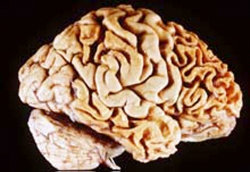Jeff Hawkinson had always taken pride in being an impeccable dresser.
It was a requirement of his job as national spokesman for Caterpillar Inc. in Peoria.
But one morning in January 2000, Hawkinson showed up for work wearing a striped tie that clashed badly with his striped shirt.
No one knew it yet, but at age 53, Hawkinson was displaying the first signs of FTD, a cruel, baffling and fatal brain disease.
FTD, short for frontotemporal dementia, is believed to be the second-leading cause of dementia illness after Alzheimer's disease. But unlike Alzheimer's, it is not a disease of old age -- it typically strikes people in their 40s and 50s.
'He really doesn't care'
FTD patients retain their memory, at least initially. But they gradually lose their ability to speak. They stop caring about their appearance and often display bizarre behavior such as shoplifting, doing sit-ups in public rest rooms or reading the same book over and over.
They also become emotionless and apathetic. Asked about his disease, now in an advanced stage with no hope for a cure, Hawkinson replies, "I don't care."
He says that all the time.
"He really doesn't care," said his wife, Cathi.
Experts disagree about how common FTD is because it's often mistaken for other conditions such as depression, mania, psychosis and Alzheimer's. But it's estimated that between 4 percent and 20 percent of patients at dementia and memory disorder clinics have FTD, according to the Association for Frontotemporal Dementias. Most patients die of complications of the disease within five to 15 years of diagnosis.
No one knows what causes FTD, and there are no approved treatments. "We're very, very behind in this field, compared to Alzheimer's disease," said Dr. Marsel Mesulam of Northwestern University medical school, one of the world's leading experts on FTD. "The only thing to do is provide support and education."
To learn more about what causes the disease, Northwestern and three other centers, including Rush University Medical Center, are launching a $300,000 study. Researchers will examine the brains of 271 patients who had FTD before they died.
The brains of FTD patients typically show inflammation, cell death, protein abnormalities and a buildup of particles. But no one knows what causes this damage or how to prevent it.
In the beginning, symptoms can be subtle. Cathi Hawkinson at first blamed her husband's odd outfits on job stress. But six months later, Hawkinson began having difficulty communicating. He had trouble pronouncing words, and when he got to the end of a sentence, he wouldn't be able to come up with the word to complete it. He stopped speaking up in staff meetings.
Emotionally blank
He also lost his ability to write with a pen or pencil. Later on, he was unable to use a keyboard.
Today, Hawkinson can speak only two or three words at a time, struggling to pronounce each one. He communicates mostly with a hand- held talking computer. Using a stylus, he picks out pre-programmed phrases and sentences.
In other ways, though, Hawkinson's mind remains sharp. He spends most of his time reading, especially mysteries and political books. He recently finished Bill Clinton's memoirs, and he loves watching CSI.
"If he could talk, he could give you word for word dialogue," Cathi said.
Jeff and Cathi have been married 18 years. It was the second marriage for both, and they were deeply in love. "A lot of people used to describe us as the Ronny and Nancy of Peoria," Cathi said.
But now Jeff is emotionally blank. "I have to remind him to kiss me," Cathi said. "He will hug me, but there's no feeling behind it."
Jeff doesn't show much interest in anyone else, either. He doesn't care if his children come home for Christmas, and he showed no interest when his first grandchild was born. "The old Jeff would have been on top of the world," Cathi said.
Still, Cathi said she is better off than many FTD spouses. Jeff at least does not display the bizarre behavior typical of many FTD patients, which can include:
*Impulsive acts, such as shoplifting and impulse buying.
*Hypersexual behavior, including preoccupation with sexual jokes or compulsive masturbation.
*Repetitive behavior, such as hand-clapping or humming the same song over and over.
*Gambling, overeating, alcohol abuse and financial mismanagement.
*Agitation, pacing, wandering, aggression or outbursts of frustration.
The disease often is more difficult on spouses than it is on patients.
"The stories about spouses are heroic," Mesulam said. "They put their lives on hold and never waver in their devotion."
A devoted spouse
Cathi Hawkinson typifies such devotion, said Mesulam, who diagnosed Jeff. She works from home as a public relations consultant, and never leaves Jeff alone.
Jeff has had the disease for more than five years, and continues to go downhill. His balance is off, and he is falling more frequently. He has increasing difficulty swallowing, and suffers from a chronic cough. He likely will die of a complication of FTD, such as an infection or inadequate nutrition.
For fleeting moments, Jeff still occasionally acts affectionately or displays his old wit. But for the most part, the man Cathi married no longer exists.
"The Jeff I knew, I lost a year and a half ago," she said.
Copyright The Chicago Sun-Times, Inc.
Provided by ProQuest Information and Learning Company. All rights Reserved.



